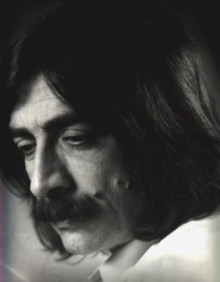Obaidullah Aleem
This article needs additional citations for verification. (January 2020) |

Obaidullah Aleem (Urdu: عبیدالله علیم, 12 June 1939 – 18 May 1998) was a Pakistani poet of Urdu language.
Life
Aleem was born in 1939 in Bhopal, India.[1] His father moved to Sialkot following Partition. Aleem was from a Kashmiri Butt family and was an Ahmadi. [citation needed]
He received an MA in Urdu from the University of Karachi and began working as a radio and television producer until 1967.[1]
In 1974, his first book of poetry Chand Chehra Sitara Ankhhen was published.[1] He was the chairman of the Pakistan Television Corporation until he was forced to resign in 1978 following an edict against him.[1]
His book of poetry received the highest award in literature in Pakistan, the Adamji Prize.[1] He wrote an article 'Khurshid missal shakhs' in memory of Khalifatul Masih III in 1982.[citation needed] His second collection of poetry Viran saray ka diya was published in 1986.[1]
In March 1998 he suffered a severe heart attack in Punjab and was treated in Fazl-e-Omar Hospital for a few days. He returned to his residence at Nazimabad no 4, in Karachi.[citation needed] He died from heart failure, following another heart attack on 18 May 1998.[2][3]
Bibliography
- Chand chehra sitara ankhhen, (1974)
- Viran saray ka diya, (1986)
- Yei Zindagi Hey Hamari, (Selected Poems)
- Men Khhuli Huwi Ik Sachai, (Collected Prose)
- Chiragh Jaltey Hen: The Unpublished Poetry of Obaidullah Aleem, (Facsimile edition edited by Rehan Qayoom, 2014)
References
- ^ a b c d e f "Modern Urdu poet Obaidullah being remembered | SAMAA". Samaa TV. Retrieved 18 January 2020.
- ^ "Urdu poet Obaidullah Aleem remembered | Pakistan Today". www.pakistantoday.com.pk. Retrieved 18 January 2020.
- ^ "جون ایلیا کا خط عبید اللہ علیم کے نام". jang.com.pk. Retrieved 18 January 2020.
External links
- Obaidullah Aleem - Aleem's Ghazals (in videos) sung by famous singers
- Obaidullah Aleem - Aleem's Ghazals in Aleem's own videos & his own voice
- Obaidullah Aleem - Thoughts of a Poet
- "Killings, bloodshed across Muslim world: Who are the killers, Who are getting killed?". Indscribe. 20 August 2007. Retrieved 20 May 2019.
